Coronavirus: Chinese student studying in India shares pandemic stories
By Xing Xiaojing and Chen Xi Source:Globaltimes.cn Published: 2020/5/7 3:40:43
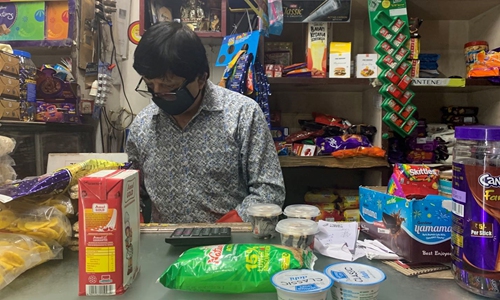
An Indian store owner sells goods to customers. Photo: Courtesy of Wu Xiaoyin
From March 25 to May 17, Chinese student Wu Xiaoyin studying in New Delhi, India, has experienced the country's three periods of lockdown due to the outbreak of the COVID-19 pandemic.
She has seen for herself how this developing country with a disparity between the rich and poor, complex religious diversity, and a large population takes measures in the fight against the virus.
Wu came to New Delhi to study the Indian language in September 2019 and planned to return to China on April 20 after finishing the language test. However, she never expected that her plan would be disrupted because of a sudden virus crisis.
The school where Wu studied announced the suspension of classes when the number of COVID-19 infectious cases in India reached over 100 on March 15. At almost the same time, various places including shopping malls, theaters and other venues across the country announced closures, as the country officially went into an anti-epidemic prelude.
Order in disorder
As the number of infected cases increased and more flights were being canceled, many of Wu's friends chose to return to China, but Wu told the Global Times that she did not want to be a burden on the motherland so decided to stay in India and take care of herself.
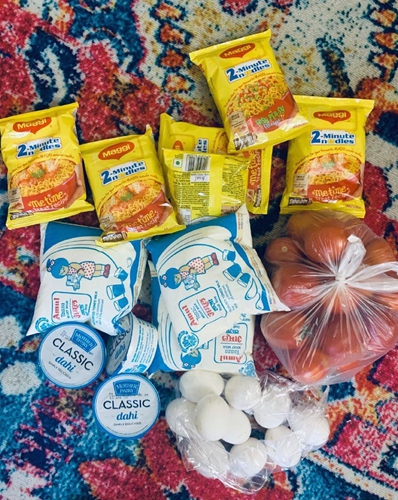
Daily necessities that Wu Xiaoyin purchases. Photo: Courtesy of Wu Xiaoyin
After making the decision, she was anxious, not because she was afraid of getting infected but because she worried about social disorder and people panicking. Wu said some medical staff suffered discrimination from communities and were labelled "god of plague" and "virus carrier" while some citizens were detained by police for opposing the lockdown policy.
But the preventive measures that the Indian government took impressed her. "They are really the most suitable low-cost epidemic prevention measures for India," Wu said.
Due to technical limitations, Indian people do not use healthy QR codes on phones. Instead, epidemic prevention staff stamp a seal on the hands of those who need to be quarantined. The seal shows the quarantine date and stays on for 2 weeks before fading.
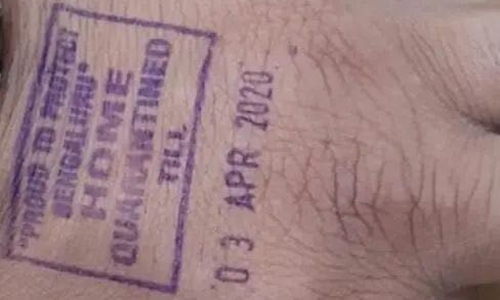
The seal stamped on the hands of those who need to be quarantined. Photo: Web
High population density is a major feature of India. In order to keep a safe distance, supermarkets allow only one or two customers in to shop at one time, while others are required to wait in line outside. They maintain a safe distance by standing inside white circles drawn on the ground.
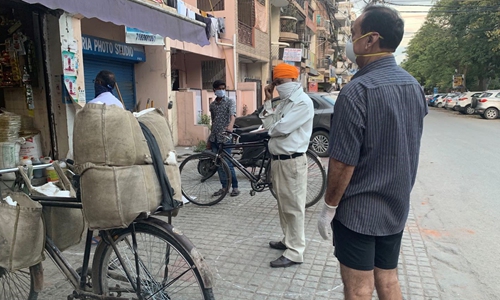
People stand in white circles which are drawn to help keep social distance in New Delhi, India. Photo: Courtesy of Wu Xiaoyin
Wu said she has seen the character of courage and decisiveness in Indian people through the pandemic and says they are very aware of the novel coronavirus.
Compared with other countries that usually give citizens a few days to prepare for lockdowns, the 1.3 billion Indians only had four hours, but after two to three days, the capital city became quiet and clean. Measures such as cancellation of visas for foreigners, cancellation of international flights, and close tracking of inbound tourists from dangerous areas were taken immediately.
"The nationalism and patriotic spirit of the Indian people has helped maintain social order," said Wu.
More communication
Currently, Wu is experiencing her third period of lockdown -- from May 3-17 in India. She extended her visa to June and received a health bag containing facial masks, medicine and wet tissues from the Chinese Embassy in India, which made her feel more content.
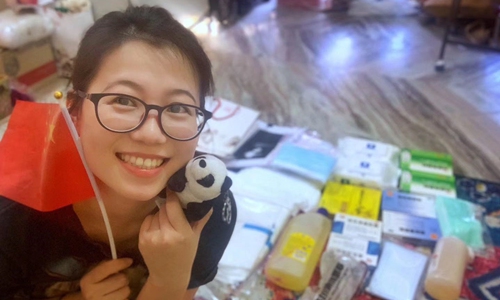
Wu Xiaoyin receives virus prevention package from the Chinese Embassy in India. Photo: Courtesy of Wu Xiaoyin
Wu believes that the current epidemic situation in India is "gradually coming under control." The entire country is divided into green, orange, and red areas according to the severity of the epidemic. Various regions have different degrees of policy relaxation.
She appreciates how India has guided domestic public sentiment. For example, when the country first announced the lockdown policy, almost all Indian celebrities and stars from different levels used their influence to tell the public how to take proper prevention measures.
As a Chinese in India, Wu called for more communication between the two countries as misunderstandings, rumors and discrimination still exist in the country. "Just like many Chinese have never been to India, many Indians have never been to China.
"Some Indians thought fake videos that smeared China were real, which made me feel bad," she said and added that some of her friends studying in other cities in India were asked to move out of their student's apartments as an excuse to use the units as quarantine places while students from other countries could stay. Some people would even call them "Chinese virus", but such behaviors were stopped by some locals.
"If we have more people-to-people exchanges, many unnecessary misunderstandings will be solved," she said and wished that people from all over the world could be united in the virus battle.
Posted in: SOCIETY,CENTRAL & SOUTH ASIA